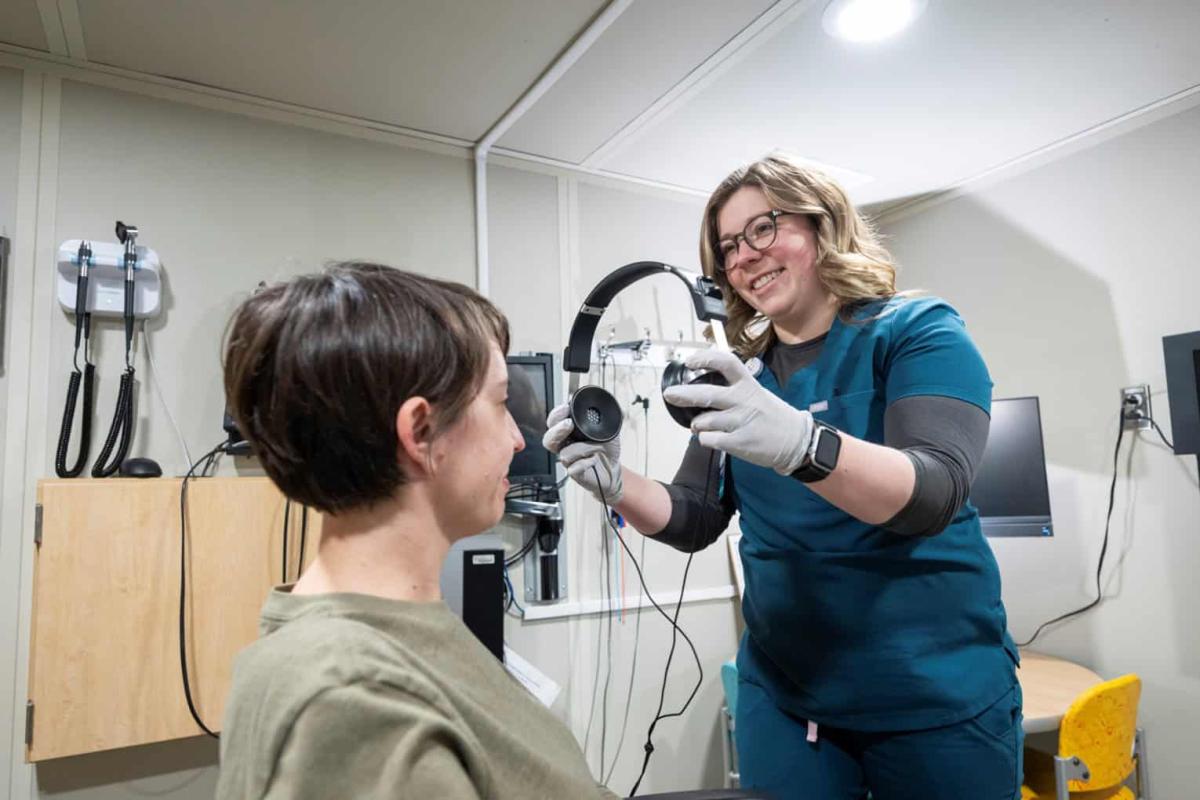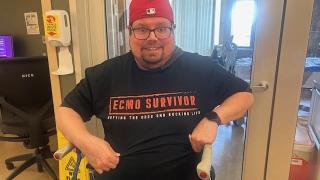
March is "Brain Injury Awareness Month," so we took the opportunity to sit down with four of our expert TBI Program therapists and clinicians to get answers to some of the most frequently asked patient and family questions about common cognitive, balance, vision and mood symptoms after TBI and concussion.
What does a Speech Language Pathologist do to help people with short term memory issues after a concussion?
Janae Bruns, Speech Language Pathologist: After a concussion, a speech pathologist works with the individual to figure out what types of things they are having a hard time remembering. The speech pathologist then provides tailored strategies that may be helpful. For example, they may discuss using a planner to help remember and track appointments or using alarms to help remember to take medications, depending on a person's strengths or deficits after injury.
How can a Speech Language Pathologist help a person get back to work or school sooner?
Janae Bruns, Speech Language Pathologist: A speech pathologist works with the individual and the whole TBI team to develop accommodation plans to ensure the individual's success as they transition back to work or school. These accommodations might include shortened hours and scheduled breaks among other things tailored to each patient.
Why do some people feel dizzy after a TBI or concussion, and how could an Audiologist help them?

Mary Beth Trine, MS, CCC-A, Audiologist: Let me explain how your balance works. Your body has three "helpers" that keep you balanced: Your inner ears (balance system), your eyes, and your muscles and joints. These three "helpers" work together so you know which way is up and how far things are from you. Sometimes the balance system in your inner ear is impacted by a head injury. This can make you feel dizzy or wobbly when you walk, and there are a few main reasons why different patients might have dizziness symptoms:
- BPPV: Feeling Like You're Spinning: "BPPV" means "Benign Paroxysmal Positioning Vertigo." This happens when tiny crystals in your ear get knocked loose (especially after hitting your head). When these crystals roll into the wrong place, you might feel like you're spinning. This usually happens when you tilt your head, like when you get in or out of bed. A doctor or vestibular trained therapist can help fix this by moving your head in special ways to put the rocks back where they belong.
- One Ear Balance Problem ("Unilateral Peripheral Vestibular Deficit"): "Unilateral Peripheral Vestibular Deficit" means the balance system in just one of your ears is damaged. If this happens, you might feel dizzy for minutes or hours. You might also feel lightheaded, see blurry, or feel sick to your stomach. These feelings usually get better over time. A physical therapist can teach you exercises to help your brain adjust faster.
- Both Ears Balance Problem ("Bilateral Vestibular Deficit"): "Bilateral Vestibular Deficit" means both of your ear balance systems aren't working right. If this happens, you won't feel spinning. Instead, you'll walk with your feet wide apart and feel very unsteady. Walking in the dark or on bumpy ground becomes extra hard. For safety, you might need to have night lights in your home, remove loose rugs that could trip you, and in some cases use a cane or walker to help you stay steady.
- Balance Center Problems ("Central Vestibular Deficit"): "Central Vestibular Deficit" means the balance center in your brain is showing signs of deficit. If this happens, you'll have different problems depending on which part is impacted.
If you're having trouble with dizziness or balance, ask your doctor for a referral to an audiologist. We can test your balance system, get to the bottom of your problem, and help you find the right treatment.
Can people lose their hearing from a concussion or TBI?
Mary Beth Trine, Audiologist: Yes, some people can lose their hearing after a brain injury or concussion, and an Audiologist can test to determine which type of hearing loss a person has, since treatment options depend on the type of loss. There are four types of hearing loss after a head injury:
- "Sensorineural Hearing Loss" happens when the inner ear (cochlea) or hearing nerve gets damaged. For example, if the bone around your ear breaks, it might tear the hearing nerve. This stops sound messages from reaching your brain. This kind of hearing loss usually doesn't get better on its own. Hearing aids can help.
- "Central Hearing Loss" happens when the hearing parts of your brain can't understand the messages from your hearing nerve anymore. This type is harder to fix. People with this problem need to learn other ways to understand what people are saying, like watching lips move.
- "Conductive Hearing Loss" happens when sound can't travel through your ear canal or middle ear. Common causes of this could be dried blood or earwax blocking your ear canal, trauma or damage to the eardrum, or damage to the tiny bones in your middle ear. Some of these problems heal by themselves, while others might need a doctor to fix them.
- "Mixed Hearing Loss:" This is when you have both sensorineural and conductive hearing loss at the same time. Doctors might use surgery or hearing aids (or both) to help you hear better.
Are vision problems common after a TBI or concussion? What does Occupational Therapy (OT) do to help?
Ally (Willner) Doege, MS, OTR/L, Occupational Therapist: After a TBI or concussion, it is common to have vision problems. Some symptoms include blurry vision, double vision, trouble reading, sensitivity to motion, and other vision issues. If someone has these symptoms after a concussion or brain injury, they should see an eye doctor—especially one trained in vision problems caused by brain injuries. These doctors are called Developmental Optometrists or Neuro-Optometrists. They have special training to check and treat vision changes after a brain injury. How Occupational Therapists Help with Vision Problems Occupational therapists (OTs) help people do everyday tasks like reading, using a computer, or driving. Since vision problems can make these activities difficult, OTs use special exercises and activities to help the eyes and brain work together again. This helps people get back to their daily routines. For the best results, vision therapy should be combined with care from a Developmental or Neuro-Optometrist. At Hennepin Healthcare, our occupational therapists and eye doctors work as a team to provide complete care for people experiencing vision problems after a concussion.
Are mood changes normal after TBI or concussion?
Dr. Rachael Ajetomobi, PhD, LP, HSP, Health & Rehabilitation Psychologist: Yes, mood changes can occur after a traumatic brain injury (TBI). These changes may result from direct damage to areas of the brain responsible for emotional regulation or from the challenges of adjusting to life with a brain injury. Traumatic brain injuries can lead to cognitive, emotional, behavioral, and social changes. Damage to specific areas of the brain may affect how a person feels and expresses emotions. Additionally, the experience of living with a TBI often involves adjustments to changes in levels of independence, an increase in medical appointments, time away from work, financial stress, and other significant life changes. The combination of these factors—changes in brain functioning, potential trauma from the mechanism of injury itself, medical hospitalization, and needed adaptation to physical changes—can contribute to mood changes after a TBI. Common types of changes in mood can include difficulty with emotional regulation, depression, anxiety, or post-traumatic stress symptoms. A clinical psychologist can help assess and treat mood changes. *If you or someone you know is experiencing suicidal thoughts, it is important to seek mental health support immediately. Contact a crisis helpline such as the COPE crisis line at 612- 596-1223, or the suicide and crise lifeline at 988 or 1-800-273-8255. You can also go to Acute Psychiatric Services (APS) at Hennepin Healthcare downtown campus which accepts walk-ins from 7 am – 11pm, 7 days a week, or call them 612-873-3161.
What are some ways to cope with feeling down or anxious after a TBI or concussion?

Dr. Rachael Ajetomobi, PhD, LP, HSP, Health & Rehabilitation Psychologist: There are many effective coping strategies and treatment interventions to support emotional adjustment after a brain injury. However, it is important to recognize that recovery from a traumatic brain injury (TBI) may require a combination of coping strategies targeting various areas, as the effects of a TBI extend across social, emotional, physical, behavioral, and cognitive domains.
Acknowledge Your Emotions: First and foremost, allow yourself to experience your emotions. It is normal to feel sadness, fear, overwhelm, or uncertainty after a TBI. Many individuals have never experienced a brain injury before, and the unpredictability of recovery can be intimidating. Recognizing and validating these emotions is an essential first step in the adjustment process.
Effective Coping Strategies
- Seek Professional Support – Schedule an appointment with a psychologist or mental health provider to process your experiences, learn emotional regulation techniques, and develop coping skills.
- Follow Medical Guidance – Keep up with medical appointments, adhere to prescribed medications, and participate in recommended therapies. Establishing a recovery routine can provide a sense of control.
- Practice Self-Care – Prioritize rest, nutrition, and hydration. Take breaks between tasks, practice deep breathing exercises, and engage in quiet time to recharge.
- Stay Engaged in Activities – Loss of interest in previously enjoyed activities is common. Continue engaging in pleasurable activities, even if they need to be modified in duration, intensity, or frequency.
- Manage Stress and Build Coping Skills – Explore relaxation techniques such as meditation, mindfulness, or gentle physical activities to reduce stress.
- Identify Emotional Triggers – Pay attention to potential triggers, such as fatigue, sensory overload, or specific memories, and develop strategies to manage them.
- Lean on Your Support System – Accept help from friends and family. Connecting with others can provide emotional reassurance and practical support.
- Be Patient with Your Recovery – Everyone heals at their own pace. Give yourself grace and the time needed to adapt and recover.
Recovery Takes Time: Adjusting to life after a TBI can be challenging, but it does improve. If you or a loved one are experiencing difficulty with emotional regulation, depression, anxiety, or trauma-related symptoms, consider reaching out to a healthcare provider, mental health therapist, or crisis support service. You are not alone, support is available. Early intervention can help improve emotional well-being and overall recovery. Work with your healthcare team and seek support from loved ones.



